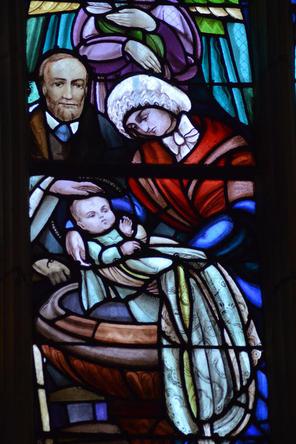Infant Baptism
(1963)
In February of 1963, while serving as a young Lieutenant JG Naval Aviator with Patrol Squadron 23 (VP-23) at NAS Brunswick, ME, I received a call from my sister Patricia asking if I would be willing to be the Godfather for her new baby girl Laurie. I quickly agreed, and on a cold Sunday afternoon made the long four hour trek (in my Navy Blues) to Sacred Heart church in Waterbury, CT. Upon arrival it was very dark and dreary, and when entering the church I could not help but reflect upon the years spent earlier at Sacred Heart High School immediately adjacent to the church itself.
Then, after gathering around the baptismal font, the young priest performing the baptism asked me to hold Laurie's tiny hand as he proceeded with the Rite of Baptism. Somehow, I thought holding the baby's hand was a strange request, but readily complied. Then, as he poured the baptismal water over Laurie's infant head reciting the baptismal formula: "I baptize you in the name of the Father, the Son and the Holy Spirit"—a powerful charge of energy entered into the child traveling through my hand and up my left arm.
I immediately recognized that I had just experienced a manifestation of the Holy Spirit's power, but for many years, quietly sequestered this experience to the realm of mystery. Only much later in life, when I had a better understanding regarding the Sacrament of Baptism, did I share this experience with Laurie—now a mom in her forties.
According to the Catechism of the Catholic Church (Section 1252): “The practice of infant Baptism is an immemorial tradition of the Church. There is explicit testimony to this practice from the second century on, and it is quite possible that, from the beginning of the apostolic preaching, when whole ‘households' received baptism, infants may also have been baptized”. In fact, Origen of Alexandria, an early Christian scholar, states that the practice of baptizing infants is of apostolic origin. However, the Didache, the earliest appearance of non-biblical baptismal instruction, speaks only of adult baptism.
Following the Protestant Reformation, Lutherans continued to practice infant baptism teaching that God mandated it through the instruction of Jesus Christ, "Go and make disciples of all nations, baptizing them in the name of the Father and of the Son and of the Holy Spirit (Matthew 28:19)", in which Jesus does not set any age limit and the command is general. However, Baptists, and other Christian traditions, believe that faith is a matter between God and the individual (religious freedom). To such traditions it means the advocacy of absolute liberty of conscience. Also, some Christian traditions insist on immersion as the only mode of baptism and some may not believe that baptism is necessary for salvation. In addition, most non-denominational churches will only baptize committed adults and infants are "dedicated" to Christ—often in a community celebration.
While spiritual “experience” is not the arbiter of truth, it cannot be ignored—especially when buttressed by the historical doctrinal teaching on infant baptism. However, agreeing with doctrine is one thing while assenting to its unrestricted implementation is quite another. What I mean by this is that following the baptism of an infant the first essential is that the child be raised by his or her parents as a Christian embalmed—as it were, with the fruits of the Holy Spirit.
Tragically, in the many years following this baptismal experience I have at times witnessed infants receiving the Sacrament of Baptism where the parents did not possess a Christian ethic—but rather were deeply rooted in the value systems of this world and its attendant and confusing darkness. The Sacrament was dispensed, and while the Holy Spirit did imbue His living reality, the child was left bereft of the necessary fostering needed to continue to grow in grace and holiness. This should not be so.
Infants having parents uncommitted to Christ and unwilling or unable to rear their child in the fullness of the Christian faith should not be offered infant baptism without first committing to the practice of the Christian faith. Without this commitment the baptism of an infant child becomes merely a cultural event. Much more due diligence is required.
One first effort could be the requirement of the parents (and godparents) to participate in a program of formation and discipleship which can be a bible study, a Life in the Spirit Seminar, or participation in an #Alpha course—which often produces good fruit.
